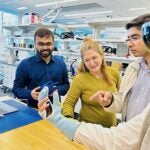Advancing technology in sensors and instrumentation is work that keeps people safe and informed about the world around us. We rely on sensors to measure the health of physical materials, the status of environmental conditions, the composition of biological matter, or the density of traffic along a highway.
Otto Gregory developed a bomb-‘sniffing’ sensor capable of detecting explosives at airports or subways. He also leads a team designing sensors to measure the temperature, pressure, and strain inside jet engines. Work is underway at the University to design smart sensors that monitor fuel cells or detect chemical leaks or terrorist attacks. Civil engineers are spearheading sensors to better monitor traffic conditions and electrical engineers are finding ways to turn fiber optic cables into millions of tiny sensors.
As an engineer, you don’t want to work on something that is not going to benefit mankind.Professor Otto Gregory
Research here will also keep us healthy. We are building tiny fluorescent spectrometry sensors to detect biomarkers in blood–the first step toward diagnosing disease. Researchers are developing sensors to detect electrical signals in the body to better understand conditions such as sleep apnea and cardiac disease. Kunal Mankodiya’s Wearable Biosensing Lab is creating wearable systems that can track important patient metrics such as heart rate vital signs, physical activity, falling, walking, or other movement difficulties in their daily life.
 2025 Biannual IEEE Underwater Acoustic Signal Processing Workshop - The University of Rhode Island held the biannual IEEE Underwater Acoustic Signal Processing Workshop last month. The workshop has been hosted at University of Rhode Island every other year since 1985. Formed as a collaboration between Naval Undersea Warfare Center, formerly Naval Underwater Systems Center, and electrical engineering faculty at URI’s College of Engineering. NUWC […]
2025 Biannual IEEE Underwater Acoustic Signal Processing Workshop - The University of Rhode Island held the biannual IEEE Underwater Acoustic Signal Processing Workshop last month. The workshop has been hosted at University of Rhode Island every other year since 1985. Formed as a collaboration between Naval Undersea Warfare Center, formerly Naval Underwater Systems Center, and electrical engineering faculty at URI’s College of Engineering. NUWC […] Could wearables be the future in diagnosing ADHD? - According to the National Institute of Mental Health, ADHD is one of the most common disorders diagnosed in children.
Could wearables be the future in diagnosing ADHD? - According to the National Institute of Mental Health, ADHD is one of the most common disorders diagnosed in children.
 International Collaboration on Arctic Research Between U.S., Norway and Canada - Dramatic changes have been observed in the Arctic Ocean in the past decades in terms of ocean temperature and salinity structure and ice-cover. Because sound travels long distances underwater, scientists have been able to use acoustic signals to localize oceanographic platforms and vehicles underwater and ice, but the way sound travels depends on the oceanography.
International Collaboration on Arctic Research Between U.S., Norway and Canada - Dramatic changes have been observed in the Arctic Ocean in the past decades in terms of ocean temperature and salinity structure and ice-cover. Because sound travels long distances underwater, scientists have been able to use acoustic signals to localize oceanographic platforms and vehicles underwater and ice, but the way sound travels depends on the oceanography. URI researchers head international team exploring wearable technology to help stroke survivors - KINGSTON, R.I. – Oct. 24, 2024 The three-year project is backed by a $500K grant from National Science Foundation.
URI researchers head international team exploring wearable technology to help stroke survivors - KINGSTON, R.I. – Oct. 24, 2024 The three-year project is backed by a $500K grant from National Science Foundation.
